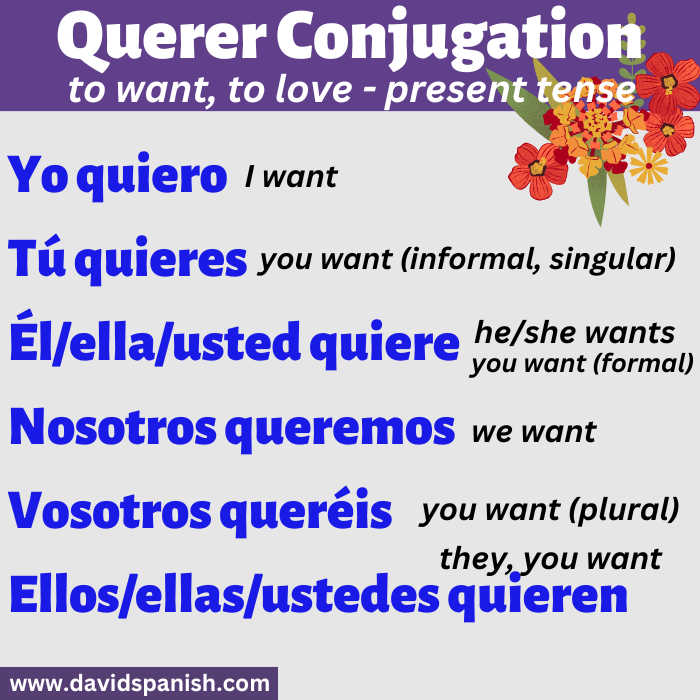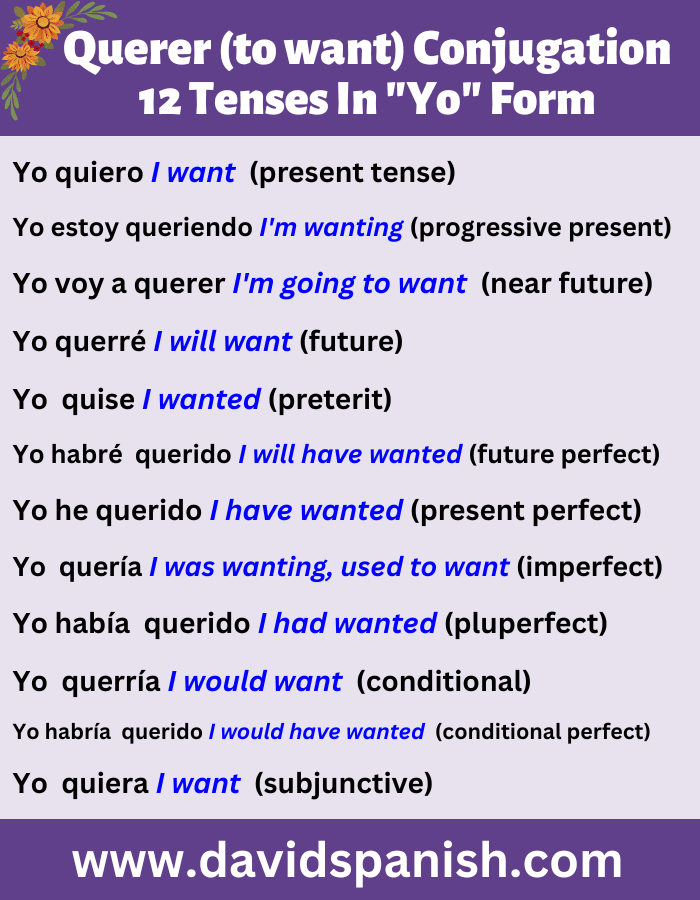The verb querer means both to want and to love in Spanish. The conjugation of querer in the present tense is: Yo quiero (I want), tú quieres (you want), él/ella, usted quiere (he/she wants, you want), nosotros queremos (we want), vosotros queréis (you want) and ellos/ellas quieren (they want).

Querer is an irregular verb. While its endings are the same as other regular ER verbs when conjugated in the present tense, its stem changes. This page on our site covers both regular and irregular Spanish ER verbs in detail.

As mentioned above, querer translates to both “to want” and “to love”. For the purpose of simplicity on this page, we mostly use the translation “to want” in our example sentences.
Further down the page we provide conjugation charts for querer with example sentences for the following six commonly used Spanish verb tenses:
- Present tense (presente de indicativo)
- Near future (futuro inmediato)
- Future tense (futuro)
- Preterite (pretérito)
- Present perfect indicative (perfecto de indicativo)
- Imperfect (imperfecto de indicativo)
Querer conjugation table

How to use querer
The verb querer can be followed by either a direct object or an infinitive. For example:
- Quiero un helado. I want an ice cream.
- Quiero comer un helado. I want to eat an ice cream.
The construction querer a + person means “to love”. For example:
- Te quiero mi amor! I love you, darling!
- ¿Me quieres? Do you love me?
- El hombre quiere a su esposa. The man loves his wife.
Querer conjugation at a glace
The following graphic covers querer conjugated in 12 tenses in the first-person singular (yo) form.

Querer conjugation charts
Present tense (presente de indicativo)
In the present tense, yo quiero translates to “I want”.
| yo quiero | I want | Quiero comprar un coche nuevo este verano. | I want to buy a new car this summer. |
| tú quieres | you want | ¿Qué quieres comer esta noche? | What do you want to eat tonight? |
| él/ella, usted quiere | he/she wants; you want | Quiere bailar con su novia. | He wants to dance with is girlfriend. |
| nosotros queremos | we want | Queremos vaijar a América del Sur. | We want to travel in South America. |
| vosotros queréis | you want | Queréis pasar dos semanas a Valencia. | You want to spend two weeks in Valencia. |
| ellos/ellas, ustedes quieren | you/they want | No quieren vender la casa. | They don't want to sell the house. |
Near future (futuro inmediato)
The near future tense is formed with the following construction: ir conjugated in the present tense + a + infinitive. Yo voy a querer translates to “I’m going to want”.
| yo voy a querer | I am going to want | Voy a querer quedarme aquí. | I'm going to want to stay here. |
| tú vas a querer | you are going to want | Vas a querer comprar un celular nuevo. | You're going to want to buy new cell phone. |
| él/ella, usted va a querer | he/she is going to want; you are going to want | No va a querer el queso. | He's not going to want the cheese. |
| nosotros vamos a querer | we are going to want | Vamos a querer salir con nuestros amigos. | We're going to want to go out with our friends. |
| vosotros vais a querer | you are going to want | Vais a querer visitar Sevilla. | You're going to want to visit Sevilla. |
| ellos/ellas, ustedes van a querer | they/you are going to want | No van a querer comer en este restaurante. | They're not going to want to eat in this restaurant. |
Future tense (futuro)
In the future tense, yo querré translates to “I will want”.
| yo querré | I will want | Yo querré mudarme en un año. | I'll want to move in one year. |
| tú querrás | you will want | Tú querrás viajar el año que viene. | You'll want to travel next year. |
| él/ella, usted querrá | he/she/you will want | Él no querrá hacer el mismo trabajo para siempre. | He will not want to do the same work forever. |
| nosotros querremos | we will want | Querremos finir el proyecto cuanto antes. | We'll want to finish the project as soon as possible. |
| vosotros querréis | you will want | Querréis aprender los verbos antes de viajar a España. | You'll want to learn the verbs before traveling to Spain. |
| ellos/ellas, ustedes querrán | they/you will want | Estoy seguro que ellos no querrán esta casa. | I'm sure they won't want this house. |
Preterite (pretérito)
The preterite is a commonly used Spanish past tense used to express actions which occurred at specific times. Yo quise translates to “I wanted to”.
| yo quise | I wanted | Quise hablar contigo. | I wanted to speak with you. |
| tú quisiste | you wanted | ¿Por qué no quisiste comprar la casa? | Why didn't you want to buy the house? |
| él/ella, usted quiso | he/she/you wanted | No quiso salir con sus amigos. | He didn't want to go out with his friends. |
| nosotros quisimos | we wanted | Quisimos vender el coche. | We wanted to sell the car. |
| vosotros quisisteis | you wanted | Quisisteis vaijar a Roma. | They want to travel to Rome. |
| ellos/ellas, usted quisieron | they/you wanted | Quisieron quedarse a Londres. | They wanted to say in London. |
Present perfect indicative (perfecto de indicativo)
The present perfect is used to describe past actions which have a bearing on the present. Yo he querido translates to “I had wanted”.
| yo he querido | I have wanted | He querido aprender español desde hace mucho tiempo. | I've wanted to learn Spanish for a long time. |
| tú has querido | you have wanted | ¿Por qué has querido vivir a México? | Why have you wanted to live in Mexico? |
| él/ella, usted ha querido | he/she/you has (have) wanted | No ha querido cambiar de trabajo. | He hasn't wanted to change jobs. |
| nosotros hemos querido | we have wanted | Hemos querido viajar desde hace mucho tiempo. | We've wanted to travel for a long time. |
| vosotros habéis querido | you have wanted | Habéis querido comprar una casa a Barcelona. | You've wanted to buy a house in Barcelona. |
| ellos/ellas, ustedes han querido | you/they have wanted | No han querido ayudarnos. | They haven't wanted to help us. |
Imperfect (imperfecto de indicativo)
The imperfect tense is used to describe actions which used to occur at undefined points in time. Yo quería translates to “I was wanting”, “I used to want” and “I wanted”.
| yo quería | I wanted (or used to want, was wanting) | No quería tomar una decisión. | I didn't want to make a decision. |
| tú querías | you wanted | ¿Por qué no querías estudiar francés? | Why didn't you want to study French? |
| él/ella, usted quería | he/she/you wanted | Él quería pasar más tiempo a Buenos Aries. | He wanted to spend more time in Buenos Aires. |
| nosotros queríamos | we wanted | Queríamos irnos de vacaciones a Puerto Rico. | We wanted to go on vacation in Puerto Rico. |
| vosotros queríais | you wanted | Queríais buscar empleo a Mar de Plata. | You wanted to find employment in Mar de Plata. |
| ellos/ellas, ustedes querían | they/you wanted | No querían jugar con los adultos. | They didn't want to play with the adults. |
Discover more:
- Ser Conjugation: How to Conjugate “To Be” in Spanish
- Estar Conjugation in Spanish
- Hacer Conjugation: How to Conjugate “To Make, To Do” in Spanish
- La Bamba Meaning, Spanish Lyrics & English Translation - May 4, 2024
- Bésame Mucho Meaning, Spanish Lyrics & English Translation - May 3, 2024
- Querida – Lyrics, Meaning & Translation - May 2, 2024
